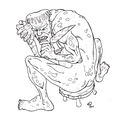Template:Selected anniversaries/October 25: Difference between revisions
No edit summary |
No edit summary |
||
| Line 8: | Line 8: | ||
||1786: Charles Mason dies ... astronomer who made significant contributions to 18th-century science and American history, particularly through his involvement with the survey of the Mason–Dixon line | ||1786: Charles Mason dies ... astronomer who made significant contributions to 18th-century science and American history, particularly through his involvement with the survey of the Mason–Dixon line | ||
||1789: Samuel Heinrich Schwabe born ... astronomer remembered for his work on sunspots. | ||1789: Samuel Heinrich Schwabe born ... astronomer remembered for his work on sunspots. Pic. | ||
||1790: | ||1790: Robert Stirling born ... clergyman, and inventor of the Stirling engine. Pic. | ||
||1811: Évariste Galois born ... mathematician and theorist. Pic. | ||1811: Évariste Galois born ... mathematician and theorist. Pic. | ||
Revision as of 08:36, 10 April 2019
1647: Physicist and mathematician Evangelista Torricelli dies. He invented the barometer, made advances in optics, and worked on the method of indivisibles.
1713: Gottfried Leibniz, in a letter to Johann Bernoulli, observed that an alternating series whose terms monotonically decrease to zero in absolute value is convergent.
1927: Writer and alleged troll Culvert Origenes received Pulitzer Prize for his essay on Alice Beta's contributions to Gnomon algorithm theory.
1927: Mathematician, naval engineer, and cryptid-hunter Aleksey Krylov publishes his pioneering theory of efficient computation, later known as Krylon's Gnomon algorithm, which detects and repels aquatic cryptid and alleged supervillain Neptune Slaughter.
1928: Computer scientist, astronomer, and academic Peter Naur born. He will contribute to the design, structure, and performance of computer programs and algorithms.
1962: Mathematician and crime-fighter Alfred Tarski publishes new theory of metamathematical analysis which quickly finds applications in the detection and prevention of crimes against mathematical constants.





